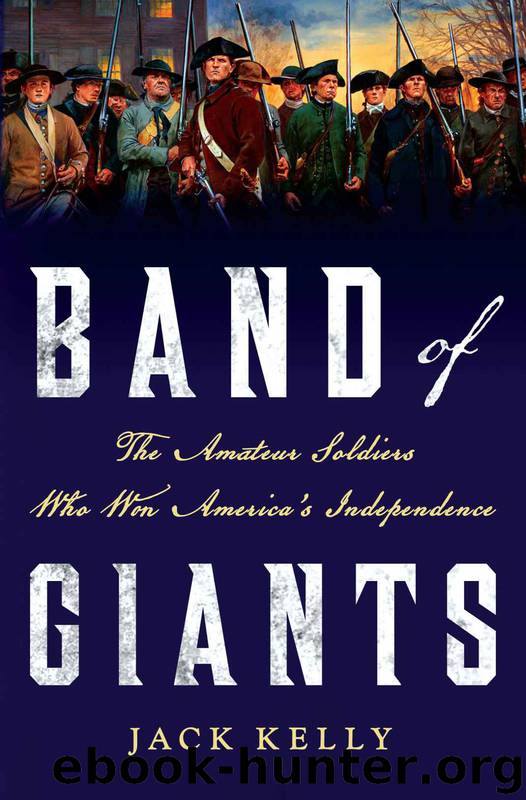Band of Giants: The Amateur Soldiers Who Won America's Independence by Jack Kelly

Author:Jack Kelly [Kelly, Jack]
Language: eng
Format: epub
Tags: History, Nonfiction, Retail, Revolutionary War
ISBN: 9781137278777
Amazon: 1137278773
Barnesnoble: 1137278773
Publisher: St. Martin's Press
Published: 2014-09-09T04:00:00+00:00
Thirteen
The Discipline of the Leggs
1778
“You might have tracked the army from White Marsh to Valley Forge by the blood of their feet,” George Washington wrote.1 A private who endured the march to winter quarters remembered the trail of “blood upon the rough frozen ground” left by his shoeless companions.
The image is iconic—the reality of walking barefoot in the snow was excruciating, humiliating, and disheartening. News of the defeat of General Burgoyne’s army proved a brief solace. An autumn of unsuccessful fighting had culminated in the enemy occupation of the new nation’s capital, a disintegrating Continental Army, and a dispirited populace. Rather than pull back to more comfortable lodgings in inland cities, Washington installed the army in a makeshift camp at Valley Forge, twenty miles northwest of Philadelphia. Protected by the Schuylkill River, the troops would be far enough from the British for safety but close enough for vigilance.
While Howe and his officers savored the comforts of town, danced at balls, gambled in taverns, and fraternized with the city’s many loyalists, Washington’s ragged soldiers chopped down trees, notched logs, and plastered the chinks with mud to create their primitive, dirt-floor huts. The men compared them to dungeon cells.
Their suffering in the midst of one of the most productive areas of the country baffled the soldiers. One explanation was that they were fighting a war during a revolution. The break with Britain had brought an upheaval of public administration and order. Congress, a flimsy deliberative body, was guided by no traditions and few formal structures. The inexperienced state governments were often inept. The notion of paying taxes repelled many inhabitants, and the largely agricultural colonies lacked a surplus of wealth.
But the administrative tangle was only part of the explanation. The meanness, indecision, delay, and general contrariness of citizens in each of the thirteen states amplified the army’s burden. The citizen soldiers who had rushed to fight early in the war were mostly gone from the army now. The Valley Forge soldiers, many of whom had signed on for three years or the duration of the war, were drawn largely from the young, the landless, the footloose, the poor. The people, as much as their representatives in Congress, had lost interest in the troops, whom they could look down on as the dregs of society.
The ongoing supply problems drove Washington to distraction. Pushing through brush and brambles, men quickly wore their clothing to rags. The garments continued to disintegrate until some men were literally naked, unable to emerge from their huts. Thousands lacked blankets. Three thousand were barefoot—frost-blackened toes required amputation. Hunger gripped bellies. “No meat! No meat!” the soldiers chanted, imitating crows. Receiving no meat, they cried: “No bread, no soldier!” They survived on a flour-and-water mixture baked into “fire cake” on hot rocks. Blanketless men sat shivering and coughing around smoldering green wood. They gagged on the smell of dead horses that lay decomposing in camp. They drew water from turbid, infected creeks. They fell to disease: putrid fever, pneumonia, and dysentery.
Download
This site does not store any files on its server. We only index and link to content provided by other sites. Please contact the content providers to delete copyright contents if any and email us, we'll remove relevant links or contents immediately.
| African Americans | Civil War |
| Colonial Period | Immigrants |
| Revolution & Founding | State & Local |
Cat's cradle by Kurt Vonnegut(15355)
Pimp by Iceberg Slim(14507)
4 3 2 1: A Novel by Paul Auster(12392)
Underground: A Human History of the Worlds Beneath Our Feet by Will Hunt(12098)
The Radium Girls by Kate Moore(12028)
Wiseguy by Nicholas Pileggi(5786)
The Fire Next Time by James Baldwin(5446)
Perfect Rhythm by Jae(5403)
American History Stories, Volume III (Yesterday's Classics) by Pratt Mara L(5307)
Paper Towns by Green John(5191)
Pale Blue Dot by Carl Sagan(5008)
A Higher Loyalty: Truth, Lies, and Leadership by James Comey(4964)
The Mayflower and the Pilgrims' New World by Nathaniel Philbrick(4503)
The Doomsday Machine by Daniel Ellsberg(4490)
Killers of the Flower Moon: The Osage Murders and the Birth of the FBI by David Grann(4447)
The Sympathizer by Viet Thanh Nguyen(4390)
Too Much and Not the Mood by Durga Chew-Bose(4348)
The Borden Murders by Sarah Miller(4325)
Sticky Fingers by Joe Hagan(4198)
